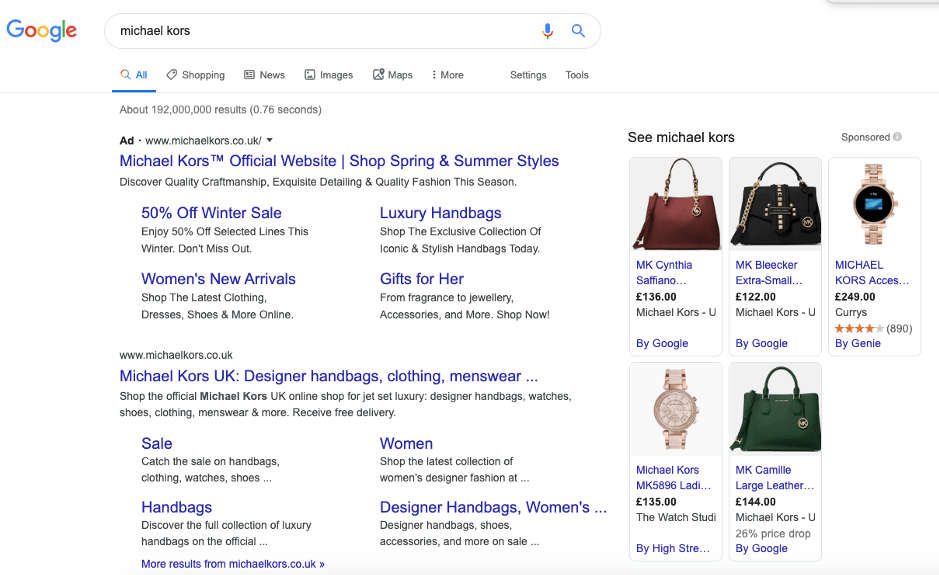Search engine dominance and bias is easy to achieve if you have a large budget.
Big brands are highly visible to search users, the unfortunate corollary to this is that unknown brands and those with small marketing budgets are almost invisible to on-line searches conducted using Google.
In this situation both the search user and independent retailers lose out. The search user might actually be interested in products from small and artisan vendors but cannot see them without extensive searching.
Even for large brands, the situation is not ideal since they may need to bear three different costs in order to claim all top spots on Google’s first page. As an example, consider a large brand such as Michael Kors. They manage to dominate the first search page of Google as seen below.
Note that the Michael Kors (TM) Official Website is the top ad that is served. They will have had to bid in order to ‘win’ the auction for the top ad slot for keywords “Michael Kors”. Yes, they actually have to enter an auction for keywords containing their own name. They won't pay Google until someone clicks their top ranking ad – but note that the ad appears above the organic (non-advertising) link to their official site. It may seem daft that they should bother to advertise with Google since they have already claimed the top organic (non-advertising) result. But, if they did not, then Google would likely serve a different ad above their organic result which might well be for Marc Jacobs or some other competitor. Thus, Google essentially force Michael Kors to pay for their own name in order to be at the top of their page! And users will click this ad since it appears above the organic result that offers similar content. This is the first cost of brand dominance on Google.
The second cost is associated with sponsored content on the right. This is simply a collection of pay-per-click ads. Not all ads are direct leads for Michael Kors, the ones that are they will pay for directly, and those that are not will be paid for by their retail agents.
The third way Michael Kors will have paid to dominate page one is through their search engine optimisation (SEO). They do not pay Google directly to optimise their ranking in the organic search, but there is a significant cost associated SEO which involves generating relevant content and inbound links on each website page that will drive the Google algorithms to rank these pages top for any given keyword.
So, page one domination on Google is expensive, but large brands have the budget to do this and it pays them to crush competition and establish brand dominance or brand oligopolies. They effectively push the smaller retailers towards obscurity in the bottom of the search rankings onto pages where users rarely venture.
In the pay-per-click world the little guys cannot afford to ‘buy’ page one since their sales revenues cannot support large advertising spend or clever marketing departments and agencies. The snake oil salesmen are always ready to guarantee SEO top rankings and pay-per-click alchemy, but the reality is it is tough. True, some small retailers can break through with low-cost viral campaigns to get noticed, and with clever choices of niche keywords they may top the ads for some Google searches. However, the reality is that most are rightly focussed on producing quality products and not on clever marketing – and so they use alternative channels to gain sales. Consequently, Google is not good at matching the right products with willing buyers, but they don’t care because their revenues are not directly based on sales, they are based on clicks.
The places to find products from the smaller retailers and unknown brands is in marketplaces where they only pay a commission on sale (which they are usually happy to do) – they are not paying for eyeballs or for clicks that do not convert into sales. The major marketplaces include eBay, Amazon and Etsy, but there are many others. Amazon actually overtook Google for product searches in 2017.
What has happened is that over time the small retailers competing in the same sectors as large brands have abandoned their (often futile) efforts with general search engines and instead listed their products on alternative retail sites. Search users have learned that they are being underserved by Google when they are shopping and now conduct their product searching across multiple retailers and marketplaces.
This current model is not great for internet users or small retailers, nor is it an efficient model even for large brands and retailers. Would it not be better to apply today’s AI efforts towards finding the thing that users want, instead of trying to make them want your thing.










